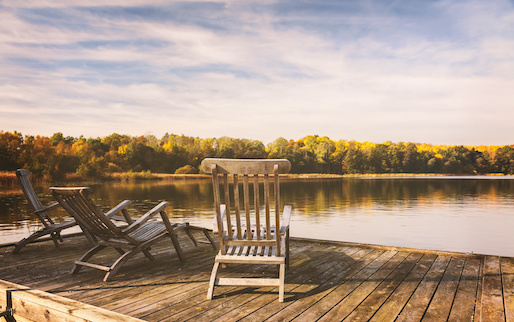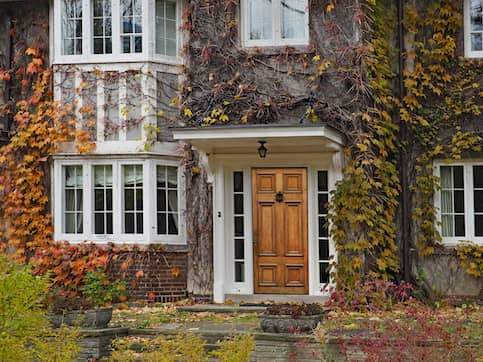A vacation home is a second residence used on occasion for leisure or recreational purposes. It could include a house, condo, cabin, apartment or any other real estate property you don’t live in year-round.
People typically purchase vacation homes in desirable locations like in the countryside, close to the mountains or near the beach. While vacation homes are usually left vacant for use by the owner during weekend getaways, holidays or even longer seasonal stays, they can also be rented out part time to generate income.
If you’re curious about buying a vacation house and are considering the advantages and disadvantages, continue reading to learn more.
Key Takeaways:
- Buying a vacation home has advantages, such as saving money on hotels, but it also comes with some downsides, such as regular maintenance.
- Before buying a vacation home with friends, you should consult an attorney to explore legal options allowing all parties to own a fair share of the property.
- If the vacation home is used solely for personal enjoyment, you can deduct interest up to a certain loan amount on your taxes. However, if you rent it out for part of the year, the IRS may consider it a rental property, which changes the rules.
Should You Buy A Vacation Home?
While a vacation home can be a great and fulfilling investment, buying one requires reviewing your finances to determine whether it makes sense. A vacation home has many benefits, but it also has some drawbacks.
Pros Of Buying A Vacation Home
By purchasing a second home, you could potentially acquire an appreciating asset and generate rental income. Investing in real estate is also generally a wise strategy for building wealth, if you can afford to do so. Some of the other benefits of owning a vacation home include:
- Saving money on lodging: Owning a vacation home can help avoid paying for hotels and eating out.
- Cooking for yourself: Having a kitchen makes cooking easier while on vacation, helping you save on dining expenses and enjoy personalized meals.
- Providing more space: A vacation home typically has more room to relax, entertain and accommodate additional guests.
- Beneficial for retirement: A vacation home can be a future retirement home, offering a familiar, comfortable and potentially paid-for house.
- Provides rental income: When not in use, a vacation home can be rented out to generate income to partly offset ownership costs.
Cons Of Buying A Vacation Home
While there are many advantages to owning a vacation home, there are some downsides as well:
- Having two mortgages to pay: A potential downside of having a second mortgage is the risk of taking on additional debt and potentially overextending yourself financially, especially if your first mortgage isn’t paid off.
- Acting as a landlord: If you rent out a vacation home, being a landlord can present difficulties, such as property management and increased maintenance.
- The property may not appreciate: If your second home doesn’t appreciate over time, it may result in financial loss on the investment.
- Risk of default: There is a potential risk of default on a vacation home during an emergency or financial crisis, as you may prioritize other expenses over your vacation home.
What’s Your Goal?
Buy A Home
Discover mortgage options that fit your unique financial needs.

Refinance
Refinance your mortgage to have more money for what matters.
Tap Into Equity
Use your home’s equity and unlock cash to achieve your goals.
What Qualifies As A Second Home?
When it comes to mortgages, a property falls under one of three categories: primary residence, second home or investment property. The main difference lies in the purpose of the property. While a primary home is typically intended for personal living, a second home is a residence the owner occupies for only a portion of the year.
To be considered a vacation home, your vacation property must meet the following requirements:
- Must be occupied by the owner for a portion of the year
- Cannot be another person’s primary residence
- Must be accessible year-round
- Must be a one-unit dwelling
- Cannot be subject to any rental, timeshare or property management agreements
Keep in mind that lenders may have additional requirements and restrictions. It is advised to discuss your expectations and intentions for the property with your lender at the start of the process.
How Second Home Status Impacts Renting Out Your Vacation Home
A second home is a property owned solely for recreational purposes and is often located in a desirable location, such as on the beach or in the mountains. If you’re interested in renting out your vacation home, there are specific requirements and restrictions you should be aware of.
For the home to qualify as a second home for tax purposes, the owner must demonstrate personal occupancy for at least part of the year, ensuring that the property is primarily used for personal enjoyment rather than as an investment property.
Various loan options are available to homeowners who want to rent out their property long term. For example, an investment property loan is designed to finance the purchase or refinance of a property intended for rental purposes. While this type of loan may offer the opportunity to generate income from a vacation home, it typically comes with higher interest rates and stricter qualification criteria than primary or secondary home mortgages.
Also, homeowners can turn to Airbnb and other peer-to-peer apps to generate extra income by renting out their vacation homes. These platforms connect property owners with potential renters, making advertising the property easier. Review the legal and tax implications of using these platforms, as they can vary from country to country.
Ready To Become A Homeowner?
Get matched with a lender that can help you find the right mortgage.
A Vacation Home Mortgage Loan: Key Steps Of The Purchasing Process
Buying a vacation home is like buying a primary home. Here are four key steps and what you should expect along the way.
1. Determine Whether You Can Afford It
If you’re thinking about purchasing a vacation home, it’s important to consider whether it’s feasible based on your current financial situation. While rental income could be possible, owning a second home comes with numerous expenses that may be only partly covered by the rental income.
Before deciding, determine if you can afford the total cost of the home. The total price includes mortgage payments, property taxes, insurance and estimated maintenance costs. If you plan to rent it out when you’re not using it, consider the income you may generate and subtract it from the total price. But you’ll also need to factor in potential losses, such as vacancies or unforeseen repairs.
When figuring out if buying a second home is best for you, start by asking yourself these questions:
- How much will I use the home?
- Will I rent the home to others?
- How much mortgage payment can I afford each month?
- Am I prepared to take a loss on the property?
- What will I do if the property doesn’t generate revenue as planned?
2. Decide What Type Of House You Want
Your vacation home should suit your lifestyle, needs and preferences. A condo offers lower maintenance responsibilities, a prime location and shared amenities, but it is generally less customizable. A single-family house provides greater privacy and control but has increased maintenance responsibilities and potentially higher upfront costs.
The type of property also depends on your ideal location. It’s best to research potential areas based on proximity to amenities, climate and overall vibe. Look at the potential liability and risks associated with your dream home’s location. For example, wildfires in California and hurricanes in Florida have led some insurance companies to drop coverage or deny claims in these areas.
Lastly, consider the amenities you want, the property’s future resale value and the balance between community living and personal space. Visit properties to get a firsthand feel for the neighborhood and seek guidance from a local real estate professional to navigate effectively.
3. Determine Whether You Want To Rent Your Second Home
To decide whether to rent your vacation home, consider several factors, including your intended usage and return on investment (ROI). Begin by reviewing the value of the property. Then, consider the mortgage requirements, including the mortgage rate, APR, down payment and closing costs. Compare other properties in the area to assess the average rental rates. Lastly, consider additional expenses, like maintenance costs, homeowners association (HOA) fees, home improvements, property taxes and homeowners insurance.
Remember that renting out your home will limit your flexibility to use it whenever you want. Some lenders may also have limitations or restrictions on renting a vacation home.
4. Qualify For A Second Home Mortgage
If you need to purchase the home with a mortgage, you must meet the following requirements to qualify. Keep in mind, these will vary by lender.
- Credit score: Lenders typically require a minimum credit score of 620 for a second mortgage. This score reflects a borrower’s creditworthiness and ability to handle additional debt.
- Debt-to-income (DTI) ratio: This shows how much of your income goes toward paying your debt. The maximum debt-to-income ratio is typically around 43% for most lenders.
- Down payment: Because a second mortgage is an additional mortgage, lenders may require a higher down payment. A minimum down payment of 10% is typically required.
Once you’ve figured out that you’re eligible and have secured approval for a second home mortgage, you can start looking for an experienced real estate agent to aid in your search for a vacation home.
Take The First Step To Buying A Home
Find a lender that will work with your unique financial situation.
Other Considerations When Buying Your Vacation Home
If you’re thinking about purchasing a vacation home, you should consider all the potential costs, not just the price of the house.
Maintenance And Repair Needs
To make sure you’re financially ready to cover these expenses, you should consider budgeting 1% of your home’s purchase price for maintenance. While this may not be a perfect measurement, it can be a good rule of thumb for calculating how much you should have in savings. It’s also important to consider the age and condition of your home. Older homes typically require more maintenance and can be more expensive to keep in good condition.
Insurance
If you plan to buy a property near water or a heavily forested area, estimate the amount you will spend on insurance. Such areas are at a higher risk of experiencing environmental hazards such as wildfires, hurricanes and floods.
A homeowner who owns a vacation home in a coastal area, for example, may require hurricane insurance to protect their investment from damage caused by a severe storm. Similarly, if you own a vacation home in a flood-prone area, you may need flood insurance to protect against damage caused by rising water levels.
Taxes
It’s worth noting that a second home is eligible for the mortgage interest tax deduction. But there are specific requirements to qualify for the deduction. The same applies to reporting your rental income. For example, if you rent your home for fewer than 15 days, you’re not required to report any income to the IRS. However, certain rental companies (if you use one of them) may report your income – even if it was fewer than 15 days.
In terms of paying taxes on your rental income, you may be able to deduct any related expenses. Work with a tax professional to ensure you report and deduct the correct amounts.
Buying A Vacation Home With Friends
One way to make purchasing a vacation home more affordable is to ask friends or relatives to co-own the property and share the costs.
While sharing a vacation home is not uncommon, it requires a lot of cooperation and compromise. Here are some questions to ask when debating whether to share a vacation home property:
- What happens when one of us can’t pay our share of the mortgage?
- Is everyone else able to cover their portion?
- What if the person responsible for making payments is late one month?
- What happens if someone decides they want out of the deal?
- Can everyone else afford to buy out their share?
- Should we set up a tenancy in common (TIC)?
Friends may choose TIC if they want to buy a vacation property together but are interested in different levels of investment and usage rights. TIC can make the mortgage approval process easier because tenants can use combined assets and incomes on their application.
Buying A Vacation Home FAQ
Now that we have discussed buying a vacation home, let’s examine some frequently asked questions.
The Bottom Line About Buying A Vacation Home
As you can see, if you want to buy a vacation home, you must ensure you’re ready. Speaking with a mortgage lender and real estate agent will help you determine if the time is right. Finally, consult a tax advisor or financial consultant who can help you navigate renting the property out, if you choose to do so.
Researching all the costs and risks of buying a second home will make owning a vacation home for you and your family that much more rewarding and stress-free.
If you are ready to get pre-qualified for a vacation home, Quicken Loans can help .

Ben Shapiro
Ben Shapiro is an award-winning financial analyst with nearly a decade of experience working in corporate finance in big banks, small-to-medium-size businesses, and mortgage finance. His expertise includes strategic application of macroeconomic analysis, financial data analysis, financial forecasting and strategic scenario planning. For the past four years, he has focused on the mortgage industry, applying economics to forecasting and strategic decision-making at Quicken Loans. Ben earned a bachelor’s degree in business with a minor in economics from California State University, Northridge, graduating cum laude and with honors. He also served as an officer in an allied military for five years, responsible for the welfare of 300 soldiers and eight direct reports before age 25.












